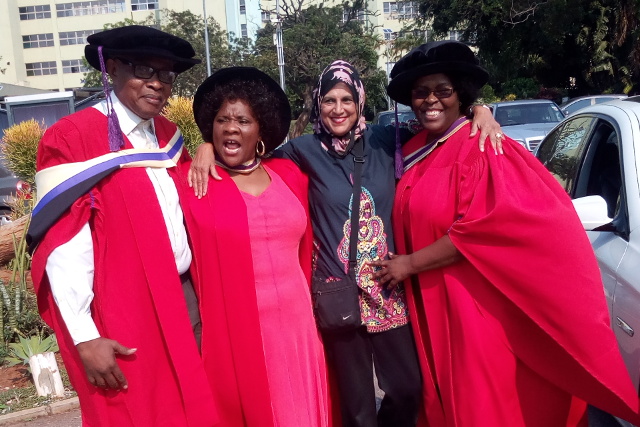This autumn, Dr Mogapi Mohapi and Dr Busisiwe Nkosi are the first students to graduate with the new PhD in Health Sciences qualification at the Durban University of Technology.
Dr Mohapi and Dr Nkosi will graduate this morning for their doctoral degrees in Health Sciences. Born in Bloemfontein, Dr Mohapi, who is a Senior Lecturer in the Department of Biomedical and Clinical Technology at DUT, has been an academic since the days of M.L Sultan Technikon. The merger between M.L Sultan Technikon and Technikon Natal was one of the reasons that he was motivated to further his studies.
Dr Mohapi registered for his PhD in 2013 with the title of his thesis being: The efficacy of an instructional Model on the quality of Teaching and Learning Using Assessment. According to Dr Mohapi, the study took two years and 10 months to complete under the supervision of Professor Jamila Adam and Professor Thengamehlo Ngwenya.
“My research was undertaken to promote and encourage lecturers to adopt, not only conventional instructional strategies and practices but to also promote and encourage integrated, authentic, dynamic and innovative instructional strategies and practices such as active learning (AL), where students are encouraged to enthusiastically participate and engage with learning, teaching and assessment,” said Dr Mohapi.
The research study aims to investigate the efficacy of the student-centric, researcher-designed integrated performance-based instructional model namely, integrated Teaching and Learning Model Using Assessment (ITLMUA) to enhance the effectiveness, efficiency and quality of student learning and teaching. The ITLMUA provides a pragmatic theoretical framework for developing and enhancing perceptions and conceptions of pedagogies that are underpinned by educational and psychological theories, with a focus on using assessment information to empower lecturers to review, reflect and enhance the educational constructs of teaching, learning, assessment and educational research. The evaluative criteria to determine the efficacy of the ITLMUA were effectiveness, usability and participants’ satisfaction with regard to academic benefits, utility, expressive and suitability to instructional strategies and practices in higher Education (HE).
Meanwhile, for Dr Nkosi, who joined DUT in 2013 after working for 28 years at the Gauteng Department of Health as Head of Department in Radiography and Chief Radiographer in Radiotherapy, she was motivated to explore opportunities in order to be successful and to improve the lives of other people. She registered for a PhD in June 2014 and the title of her dissertation was: A framework of Co-operative Practice between Radiation Oncologists and Traditional Health Practitioners in the Management of Patients with Cancer in KwaZulu-Natal Province.
“The aim of my study was to explore the practice of traditional health practitioners in the treatment of patients with cancer in order to describe a viable, co-operative practice between them and radiation oncologists and to ultimately, develop traditional health practitioners as a component in the health system in the treatment of cancer patients,” explained Dr Nkosi.
Adopting an exploratory, descriptive, qualitative study using an interpretive phenomenological approach was employed to collect data from 28 traditional health practitioners and four radiation oncologists in KZN; utilising snowball and stratified purposive samplings. Semi-structured face-to-face and group interviews were employed to collect primary data from traditional health practitioners and data from the radiation oncologists were collected through face-to-face and email interviews.
“It emerged that the referral of patients, in addition to external conditions, individual attributes, trusting attitudes of participants as well as organisational dynamics and philosophy of practice, were the main categories used by participants in their understanding of co-operative practice in KZN,” adds Nkosi.
Dr Nkosi said upon selecting her area of study, during her career as a therapy radiographer, she noticed that some cancer patients did not adhere to instructions of completing radiation treatment. “Some informed us that they were consulting with traditional healers because of their cultural beliefs. The results of this study indicated that despite the mandate by the government for traditional healers and cancer specialist, the radiation oncologists, to work together and refer patients between them, they have negative perceptions about each other’s treatment. Consequently, cancer patients move freely between the health practitioners and interrupt treatment. However, the study also showed that with mutual trust and respect, both health practitioners are willing to work together in harmony,” she said.
Dr Mohapi and Dr Nkosi graduated at the Fred Crookes Sports Centre during the Faculty of Health Sciences graduation ceremony at the Steve Biko campus in Durban.
Pictured: Dr Mogapi Mohapi (Graduate of the new PhD in Health Sciences), Professor Nokuthula Sibiya (Dr Nkosi’s Supervisor and Deputy Executive Dean at the Faculty of Health Sciences), Professor Jamila Adams (Dr Mohapi’s Supervisor and IREC Chairperson) and Dr Busisiwe Nkosi (Graduate of the new PhD in Health Sciences).
Noxolo Memela


